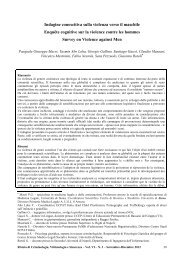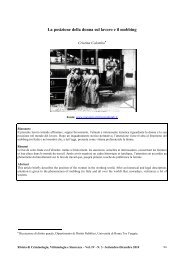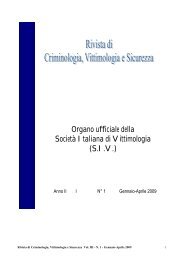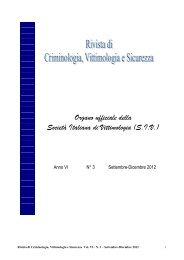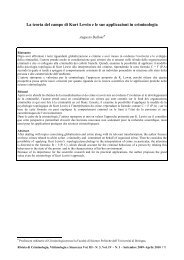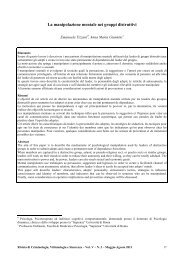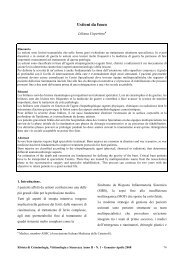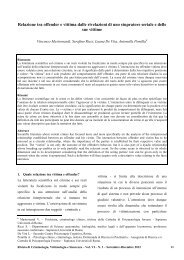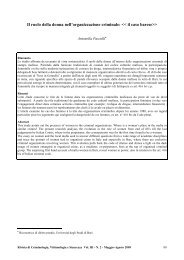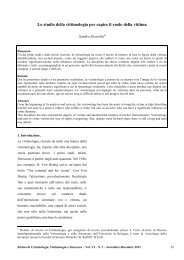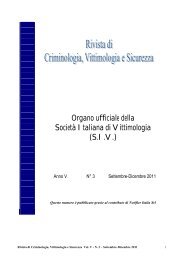Globalization, Transnational Crime and State Power ... - Vittimologia
Globalization, Transnational Crime and State Power ... - Vittimologia
Globalization, Transnational Crime and State Power ... - Vittimologia
Create successful ePaper yourself
Turn your PDF publications into a flip-book with our unique Google optimized e-Paper software.
of products, especially for export. Thus,<br />
ironically, the shipping speed made possible by<br />
computer software, <strong>and</strong> best symbolized, for<br />
example, by the “just on time” inventories which<br />
make sizeable savings <strong>and</strong> expedited service<br />
possible, also helped transnational crime ship its<br />
products quickly <strong>and</strong> undetected, taking advantage<br />
of the elimination of thorough inspections in the<br />
interest of boosting commerce <strong>and</strong> the speed of<br />
delivery 28 .<br />
6. Explosion in international travel. With the<br />
breaking down of international political <strong>and</strong><br />
economic barriers, the globalization of business,<br />
<strong>and</strong> the lowering of the cost of international travel<br />
(this may be changing now with the skyrocketing<br />
cost of fuel), there is more freedom of movement.<br />
International transportation of goods <strong>and</strong> services<br />
is also easier <strong>and</strong> cheaper. The proliferation of air<br />
transportation connections <strong>and</strong> the easing of<br />
immigration <strong>and</strong> visa restrictions in many<br />
countries to promote international commerce <strong>and</strong><br />
lucrative tourism, 29<br />
especially within regional<br />
trade blocs, have also facilitated criminal activity.<br />
In the past, more limited travel options between<br />
countries <strong>and</strong> more stringent border checks made<br />
crossing national boundaries difficult for<br />
international criminals. Now, criminals have great<br />
many choices of travel routes <strong>and</strong> can arrange<br />
itineraries so as to minimize risk. Border controls<br />
within many regional economic blocs -such as the<br />
European Union - have for the most part <strong>and</strong><br />
normally, disappeared. Even where there is still an<br />
international border, like between Mexico <strong>and</strong> the<br />
28 See for example,<br />
fcw.com/Articles/2008/07/02/Commerce-versussecurity.aspx;<br />
www.cargolaw.com/z.tcl395.html<br />
29<br />
www.articlesbase.com/.../statistics-expects-growthfor-tourism-worldwide-500803.html;<br />
Wahab S. <strong>and</strong><br />
U.S.A., traffic in both directions through the<br />
border is quite heavy as well. About 700,000<br />
persons cross that Mexico-U.S. border every day<br />
along with 150 million vehicles a year <strong>and</strong> over 5<br />
million shipping containers 30 . This great volume<br />
of traffic <strong>and</strong> trade into the United <strong>State</strong>s provides<br />
international criminals tremendous opportunities<br />
to smuggle contrab<strong>and</strong> -including drugs <strong>and</strong><br />
counterfeit products- into the country, as well as<br />
to illegally export firearms, stolen vehicles, <strong>and</strong><br />
other contrab<strong>and</strong> overseas. But these classical<br />
developments that attract organized crime <strong>and</strong> its<br />
ability to adapt <strong>and</strong> exploit new situations <strong>and</strong><br />
opportunities also impact society at large <strong>and</strong> in<br />
turn give reason to <strong>and</strong> revenues for transnational<br />
crime to flourish. International political economy<br />
scholarship has posited a criminal underside of<br />
globalization facilitated by technological change,<br />
broad patterns of state liberalization of trade <strong>and</strong><br />
capital flows, <strong>and</strong> the rise of global markets. 31<br />
There are also liberal arguments conceptualizing<br />
transnational organized crime as the epitome of<br />
capitalism within this illicit global economyembracing<br />
laws of supply <strong>and</strong> dem<strong>and</strong> in the<br />
global marketplace <strong>and</strong> challenging the very<br />
integrity of the territorial state, basically mirroring<br />
on the illegal side the role <strong>and</strong> function played<br />
worldwide by multinational corporations on the<br />
legal side 32 .<br />
J.J.J. Pigram (eds.), Tourism, Development <strong>and</strong><br />
Growth, London, Routledge, 1997.<br />
30 www.dallasfed.org/eyi/global/0109border.html<br />
31<br />
Friman H. R. , "<strong>Globalization</strong>'s Poster Child:<br />
<strong>Transnational</strong> Organized <strong>Crime</strong> <strong>and</strong> the Triumph of<br />
Liberalism?" Paper presented at the annual meeting of<br />
the International Studies Association, Hilton Hawaiian<br />
Village, Honolulu, Hawaii Online from<br />
http://www.allacademic.com/meta/p70570_index.html<br />
32<br />
M. Findlay, The Globalisation of <strong>Crime</strong>:<br />
Underst<strong>and</strong>ing Transitional Relationships in Context,<br />
Cambridge, Cambridge University Press, 1999.<br />
Rivista di Criminologia, <strong>Vittimologia</strong> e Sicurezza Vol. III - N. 3, Vol. IV – N. 1 – Settembre 2009–Aprile 2010 70



